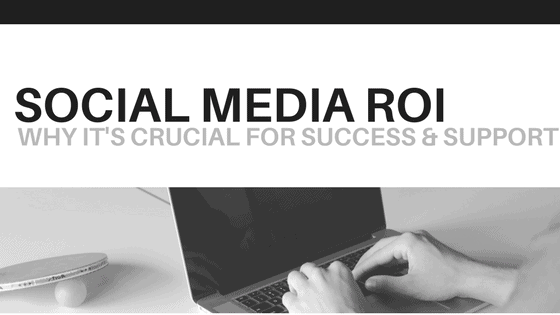Social Media ROI – Why It’s Crucial for Success and Support

Your Marketing Department needs to provide social media ROI. Plain and simple. Often, social media marketing requires more success and supporting analytics to get the same amount of support of other marketing programs, like email, because it’s still new to many marketers. The truth is, social media marketing isn’t that scary, even for B2B businesses. But most companies still approach it with caution.
As marketers, we need to be sympathetic to managers and executives who are hesitant (or even resistant) to change. After all, they are the ones assuming most of the risk, acting as the representative for your team or company. They’re responsible for all that goes right and all that goes wrong. So, when proposing social media initiatives and campaigns, it’s your job to mitigate the associated risks.
To that end, there are a few to-do’s you need to check off your list to make your social media ROI impactful before you even start crafting your formal proposal:
- Identify and understand your organization’s annual and quarterly top goals/priorities
- Choose the Marketing Department goal(s) that support the entire organization’s priorities
- Connect your social media ROI to the greater goals of the company
Accomplishing those three things is so important to your social media ROI and any social campaigns. So often, marketers are wildly passionate about successful campaigns or new ideas that we forget not everyone shares our enthusiasm. Your executive team wants to know “what does this do for us?” If you follow these three steps, you’ll have no problem addressing that question.
Identifying KPIs
Next, it’s time to identify the KPIs (Key Performance Indicators) you will use to support your social media campaign. Consider these questions when deciding on which KPIs to present:
What goal does this KPI support and how?
Choose each KPI purposefully, with the intent that these indicators will help the organization achieve its goal(s), directly or indirectly.
What type of data am I collecting to effectively report on this KPI?
Whether it’s quantitative or qualitative data, you need to be able to make the data meaningful to the goals. Achieving a number of impressions above the industry average is great, but why does that matter to the executive team’s priorities?
Additionally, you must collect the type of data that will resonate the most with management and/or the board.
How do I plan on tracking and presenting this KPI?
Before you go promising the moon and the stars to appease your manager, make sure exactly what you’re promising is possible. Sometimes, you will have to get creative to get data on a KPI that’s important to the executives. The most important part of this question is making sure you have everything you need in place to gather the data from the start of your campaign. Figuring out what you need to track your KPIs from the campaign all the way through to how your campaign and social media ROI is impacting the company’s goal is absolutely mandatory. Here are some must-haves:
- UTM links for tracking in Google Analytics
- A tool to show all-time reporting (Google Spreadsheets, BIME, CoSchedule, Dasheroo, etc.)
- Google Tag Manager to create and track events
- Conversion events set up in Google Analytics
Once these must-haves are in place, tracking (and proving) social media ROI in the future is so easy!
Now that you’ve identified the company and department goals your project is supporting, chosen corresponding KPIs, and set up necessary tracking, it’s time to bring it all together. Create a social media ROI document outlining all the important pieces: goals, KPIs, reporting, strategy, content, budget (for paid campaigns), and audiences. This is a great way to keep everything organized and easily accessible. You’ll find that those who aren’t working on the project day-to-day might forget the importance of it, the impact it’s having, and the success outlined by your social media ROI.
Having all the answers the executive team needs easily accessible and digestible, in one document, makes your life easier and keeps them happy. After all, it’s your job to remind them of the return they’re getting from an investment in social media. If you adopt the strategy we’ve outlined here, you’re sure to get the continued support you need.
You Might Also Enjoy These Posts
Demand Generation vs Lead Generation
Gamification Strategies: Badges in B2B Marketing
Welcome To DemandZEN
DemandZEN specializes in Account-Based Demand Generation and solving the challenges around finding, engaging and converting target accounts into real opportunities for B2B Technology and Services companies.


